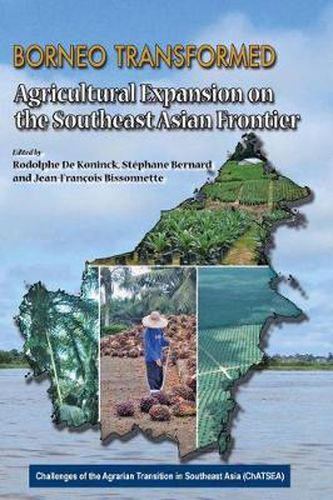Readings Newsletter
Become a Readings Member to make your shopping experience even easier.
Sign in or sign up for free!
You’re not far away from qualifying for FREE standard shipping within Australia
You’ve qualified for FREE standard shipping within Australia
The cart is loading…






Since the 1960s, Southeast Asia’s agricultural sector has experienced phenomenal growth, with increases in production linked to an energy-intensive capitalization of agriculture and the rapid development of agrifood systems and agribusiness. Agricultural intensification and territorial expansion have been key to this process, with expansion of areas under cultivation playing an unusually important role in the transformation of the countryside and livelihoods of its inhabitants. Borneo, with vast tracts of land not yet under crops, has been the epicenter of this expansion process, with rubber and oil palm acting as the spearhead. Indonesia’s Kalimantan provinces and the Malaysian states of Sabah and Sarawak have all undergone major changes but the time frames have varied, as have the crops involved. Agricultural expansion in Borneo is both an economic and a political process, and it has brought about profound socio-economic transformations, including deforestation, and development of communication networks. There has also been rapid population growth, much faster than in either Indonesia or Malaysia as a whole, with attendant pressures on employment, housing and social services. Until the end of the 20th century, agricultural expansion in Indonesia and Malaysia was largely state driven, with the goal of poverty reduction. Subsequently, as in Borneo, boom crop expansion has been taken over by private corporations that are driven by profit maximization rather than poverty reduction.
$9.00 standard shipping within Australia
FREE standard shipping within Australia for orders over $100.00
Express & International shipping calculated at checkout
Since the 1960s, Southeast Asia’s agricultural sector has experienced phenomenal growth, with increases in production linked to an energy-intensive capitalization of agriculture and the rapid development of agrifood systems and agribusiness. Agricultural intensification and territorial expansion have been key to this process, with expansion of areas under cultivation playing an unusually important role in the transformation of the countryside and livelihoods of its inhabitants. Borneo, with vast tracts of land not yet under crops, has been the epicenter of this expansion process, with rubber and oil palm acting as the spearhead. Indonesia’s Kalimantan provinces and the Malaysian states of Sabah and Sarawak have all undergone major changes but the time frames have varied, as have the crops involved. Agricultural expansion in Borneo is both an economic and a political process, and it has brought about profound socio-economic transformations, including deforestation, and development of communication networks. There has also been rapid population growth, much faster than in either Indonesia or Malaysia as a whole, with attendant pressures on employment, housing and social services. Until the end of the 20th century, agricultural expansion in Indonesia and Malaysia was largely state driven, with the goal of poverty reduction. Subsequently, as in Borneo, boom crop expansion has been taken over by private corporations that are driven by profit maximization rather than poverty reduction.